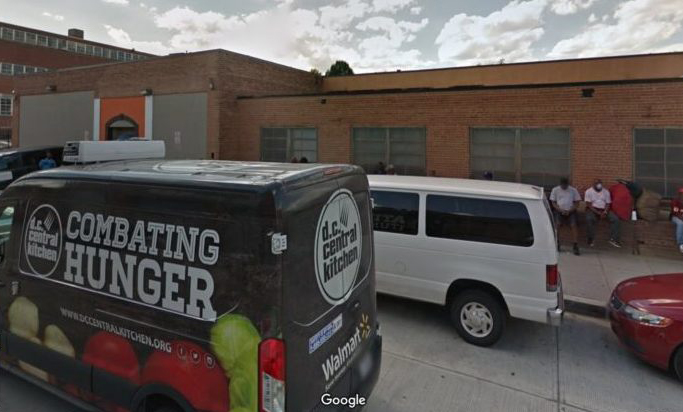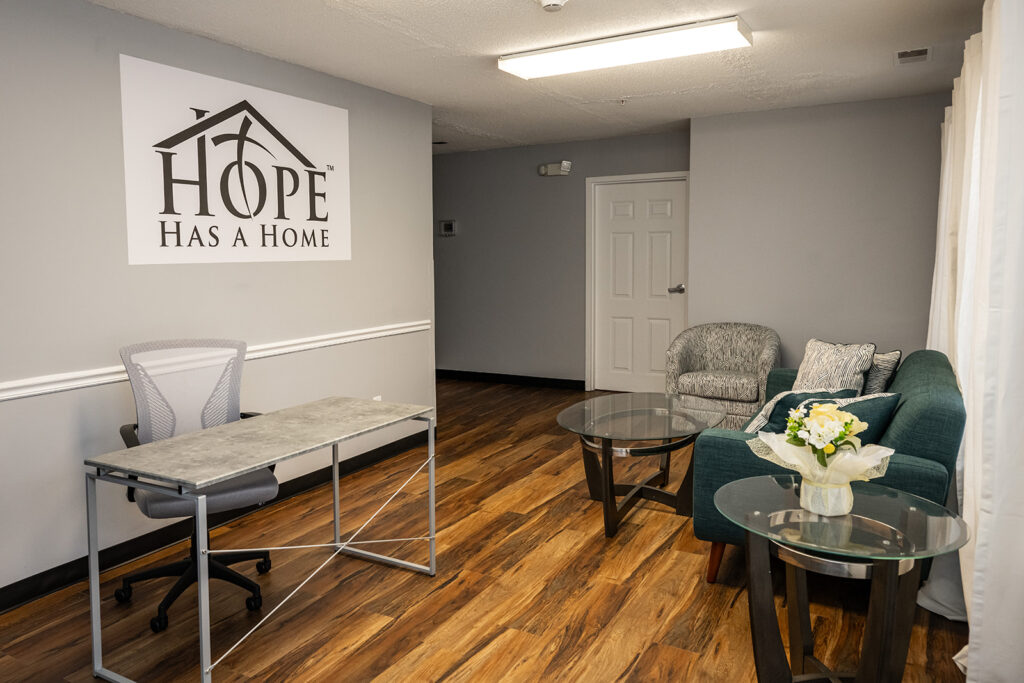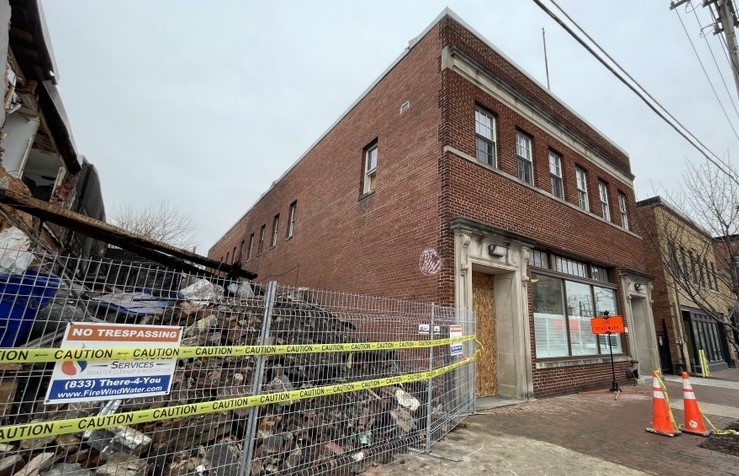There are 42 different listings for shelters on the D.C. Department of Human Services webpage. These listings are divided into four categories: family transitional housing, family year-round temporary shelters, single adult shelters, and transitional supportive housing.
The District’s choice of shelter food is one that affects all 5,900 people that stay in them.
When D.C. Central Kitchen lost the bulk of its contract to feed residents at shelters across the District to Henry’s Soul Café, the public wanted to know why. In an article published in March, The Washington City Paper noted the higher cost of the new vendor’s meals: $3.20 for breakfast and $5.18 for dinner.
In other words, Henry’s Soul Café, a private caterer that charges $1.83 more per person for a single day’s meals, somehow managed to outbid D.C. Central Kitchen, a local non-profit, for a contract worth much more.
The results appeared to be devastating to D.C. Central Kitchen. The Washington Post reported that the nonprofit — well known for its work in training formerly incarcerated and jobless people to become chefs — had lost $800,000 in projected annual revenue.
In a public statement posted to their website in April, D.C. Central Kitchen sought to play down concerns about their loss, writing “Even though this new contract is a significant blow to our current financial position, we are not going anywhere…” The nonprofit declined requests to be interviewed for this article. “We have said all we can really say on the shelter meals subject in previous media interviews,” a representative for the organization said in an email.
Henry’s Soul Café also could not be reached. Multiple employees directed all press inquiries to the company’s lawyer, who did not comment for this article.
Dinner catered by D.C. Central Kitchen
Blair shelter, a transitional housing facility still served by D.C. Central Kitchen, is located inside a converted 19th century schoolhouse. Its exterior walls, once made of white brick, have long since faded to gray. Splotches of black grow along the seams of the building, and give off the general impression of neglect.
Nestled behind the Whole Foods on H St, the shelter cannot be seen from the streetcar. A brown canvas privacy screen covers the chain link fence that runs around the property. To enter, residents have to press a video buzzer before following instructions to first push and then pull on the handle to an aluminum-framed door. A paper sign hanging on it warns visitors that it sticks. Upon entering, residents are greeted by a security guard who pats them down before inspecting them for contraband.
The shelter, despite being somewhat of an eyesore, is easily missed on a street replete with picturesque federal-style townhomes. For many residents, the food can give off this same feeling of being both present and forgotten about, of being overlooked.

During a recent visit on June 11, a local resident of the shelter named Joe Callaway alleged to have seen “spoiled boiled eggs with green on the inside” at breakfast before. Eager to corroborate Mr. Callaway’s claim, fellow residents nodded along as they stood in line to be served their evening meal from six tinfoil trays filled with turkey, mashed potatoes, and bread.
Raymond Faxio, a worker serving the meals for the Coalition for the Homeless, the organization contracted to manage the shelter, said the food, while not great, was far from awful. “It’s not going to be like home cooking,” he said. “The food is meant to sustain you.”
Before grabbing his single-serving paper plate, Callaway said he would “rather eat peanut butter and jelly” than this “stuff.” His statement was seconded by several others waiting in line for the dinner service. Of the approximately 80 guests who stay at Blair Shelter, just under half were present for this evening’s meal.
Emerson Ledwell, another Blair resident, said “It would be nice to get a variety” as he explained how difficult it was for him as a vegetarian. “Every meal there’s meat,” he explained. Neither D.C. Central Kitchen nor Henry’s Soul Café offer individualized plates for people with special dietary needs at shelters. Everyone, regardless of background, is treated to the same meal.
Ledwell skipped the turkey and ate his bread muffin by swiping it over the top of the mashed potatoes he had gathered into the middle of his plate. Some residents were quick to point out the lack of vegetables.
According to Blair House program director Maxine Young, the June 11 dinner was “not typical [because] they usually send a starch, and a vegetable.” There are specific nutritional guidelines for shelter meals. “They’re supposed to get a vegetable, a starch, a fruit, a meat…” she said.
As for the complaints, Young added, “They [residents at Blair House] have food stamps, and they can buy anything that is not on that menu, and they do have an area where they can cook.”
Residents at Blair House have access to a commercial stove and multiple refrigerators in a shared kitchen.
“If you were here in an hour or so you’ll see people making their own food,” said Jeff, a Blair resident who declined to share his last name.
“The majority will eat, and the rest will buy their own food,” Young added.
Food stamps are not a viable option for many shelter residents
The same opportunities for cooking do not exist for residents at other shelters across the District. Many shelters have no facilities for food preparation. And the process for applying for food stamps can take some time.
“Not everyone that stays in a shelter will qualify for SNAP benefits [the federally regulated Supplemental Nutrition Assistance Program commonly known as food stamps],” said Elizabeth Bowen, an assistant professor of social work at the State University of New York. “I would be very surprised if every single person in a shelter in fact has those benefits,” she added.
The process for becoming a resident at Blair House, like the process for receiving SNAP, is one that requires an application and a scheduled meeting with a case worker. The shelter has intake on Mondays, Tuesdays, and Wednesdays. Young said prospective residents who go through intake are usually allowed to start staying there within the same week or the next week.
“It’s almost impossible for [people experiencing homelessness] to use their SNAP benefits,” said Beverley Wheeler, director for D.C. Hunger Solutions. Her organization is contracted with DHS to connect with community members and makes sure they know what SNAP benefits they are entitled to. The issue with with SNAP, according to Wheeler, has to do with the program’s restrictions, which exclude hot prepared foods. SNAP isn’t a substitute for a hot meal.
“You can buy a salad. You can buy liquids. But if you’re homeless, you can only do that in really small proportions because you have no place to store it or save it,” Wheeler said. “If they could eat hot food, oh my god, what a difference that would make.”
The Healthy Shelters Act of 2019
Councilmember Mary Cheh wants to change the way the District handles shelter meals. In early April, partly in response to the Washington City paper article, she introduced The Healthy Shelters Act of 2019 to local legislators. The bill promises to bring many changes. It includes a provision “to establish nutrition standards and requirements for meals served in shelters,” and a provision to “expressly permit the use of donated and recovered food at shelters.” The bill also promises to bring greater transparency to the “contracts, reporting, and compliance” process by requiring The Department of Human Services be directly responsible for it all.

In a statement posted to her website in early April, she said, “The District has long undervalued the quality and nutritional standards of the meals served to residents and families in our homeless shelter network. In recent years, the District has paid its vendors as little as $1.50 for an adult supper –this is simply inadequate… shelters should provide healthy, dignified environments that enable residents to transition into permanent housing, and access to high-quality and nutritious food should be a part of that process.”
When asked what she thought about this legislation, Elizabeth Bowen, a faculty expert on homelessness at the University of Buffalo School of Social Work, said “Honestly, I don’t know if other cities have done anything like this. I think it sounds like a step in the right direction to push people to serve more healthy food at shelters.”
There is not much research on the quality of food at shelters, according to Bowen.
One of the only studies that can be found from recent years was conducted by a group of researchers from Massachusetts General Hospital, Harvard Medical School, and the Massachusetts Department of Public Health in 2015. The study concluded that enacting the kind of change Councilmember Cheh is proposing can make a world of a difference in homeless populations dependent on shelters and soup kitchens for food. Doing so, the conclusion states, is not so much a matter of funding as it is a matter of making educated choices.

In one example, a shelter in Massachusetts simply swapped “whole grain bread for white bread, 1 percent milk for whole milk and nuts for pastries.” The study also found that “shelters and soup kitchens provide a convenient location for nutrition education.”
As it was introduced, The Healthy Shelters Act of 2019 would provide grants for nutritional education and cooking lessons.
Beverley Wheeler, from D.C. Hunger Solutions, is also excited about the bill. Citing the changes to oversight the bill promises to bring, she said, “This new legislation will at least hold a government agency personally responsible for at least what’s happening with the food at the shelters.”
The way contracts are managed now, there is no transparency and no one can tell if shelter residents are consistently being given nutritious meals, according to Wheeler. While there are nutrition guidelines put in place by DHS, the bill would create legal requirements and charge DHS with adhering to them.
The Community Partnership for the Prevention of Homelessness, the organization DHS pays more than $80 million annually to manage city-run shelters and that manages all subcontracts with other organizations for staffing, maintenance, security, and food service at shelters, did not respond to repeated requests for comment.
It remains unclear what the nutritional standards are for shelter meals. It also remains unclear as to how the District enforces these standards.
Waiting in line for Henry’s Soul Café catered dinner
It was a typical late summer afternoon in D.C. The humidity intensified the heat just enough for 85 degrees to feel more like 95 degrees. It was one of those days when the simple act of being outside meant your shirt, dampened by sweat, would stick to your skin. At four o’clock in the afternoon, the line for the five o’clock dinner-service at Adam’s Place, was already long.
Adam’s Place is one of a cluster of nondescript red brick buildings located at the end of an industrial park in northeast D.C. On June 19, shelter residents sat on top of a short concrete wall while leaning against a chain-link fence topped with concertina wire. The fence, a barrier surrounding a private parking lot used to store some of the District’s school buses, became a kind of makeshift backrest for those waiting in line for dinner at Adam’s Place.
Asked what he thought about the food, a man who asked to be identified by the name Rosco gave a familiar answer. “Half the time I don’t eat it. The quality of the food…well, half the time it ain’t done,” he said.
Seated next to him, a man by the name of Elicio said, “It’s okay. They give us chicken, rice, string beans, potatoes…They bring us cold soda frequently, and it’s okay. They bring us bread.”
However, for residents like Matthew Argentino, there’s a problem with portion sizes. “I understand they got to have some system to not give away too, too much. But I don’t think they bring enough. These are grown men, not grade school kids,” Argentino said.
Another man named Stuart agreed. “They don’t put enough on our tray. They don’t give us a big enough portion,” he said.
Many residents waiting in line were unaware of the change in vendors from D.C. Central Kitchen to Henry’s Soul Café. Many were unaware of who the new food vendor was. They also could not agree on whether the quality of the food had improved.
One man who didn’t want to be named for the article simply said, “It got better for me, ya’ll.” While another who asked not to be named said that the food has improved.
“How are you going to say things got better? They serve the same s**t three times a week, man,” another guest retorted, drawing a mixed reaction from the other people waiting in line. Some agreed with him. Some did not.
The problem, from the view of one guest, has more to do with the cold way hot meals are served. Referring broadly to the utilitarian manner with which shelters tend to treat their guests.
“Humans that are homeless, we are not a sub-class of people. Look at this environment, it’s almost like a boot camp,” he said. This guest, like many others interviewed at Adam’s place, asked to remain anonymous out of fear of reprisal.
Adam’s Place has no kitchen for common use like Blair shelter. Guests here, however, contend with a similar security check. They must pass through a metal detector and be searched before entering.








